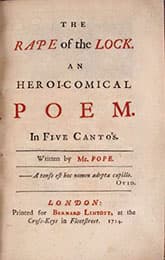The Rape of the Lock
Critique • Quotes
 1714 edition title page
1714 edition title pageFirst publication
1712
Literature form
Play
Genres
Satire
Writing language
English
Author's country
England
Length
730 lines, approx. 5,500 words
Hair, humour and hyperbole
I'm not sure why The Rape of the Lock is Alexander Pope's most famous poem.
I understand why it might have been popular in its day. It satirizes an incident that was infamous in a certain aristocratic crowd at the time, in which a lord snatched a lock of hair from a prominent young lady. Pope supposedly first wrote a short version of the poem to end the quarrel between the two. The names are changed but it was so clear (to readers of the time) who was being depicted that Pope prefaces it with a disclaimer, telling the lady in question the poetic Belinda "resembles you in nothing but beauty".
It's humorous in a pseudo-learned kind of way. Pope himself calls it "heroi-comical". Nymphs and fairies, who have nothing better to do than devote their nether lives to swooning over our heroine's wonderfulness, help Belinda with her toilet in preparation for a social event at which a fateful card game is to take place.
The game is presented as an epic medieval battle and the attack on the victorious lady's hairdo by the losing Baron is as perfidious an act as ever carried out against humankind, a disaster as momentous as the fall of Rome. It's played out over pages of hyperbole intimating the end of Christendom and civilization may be at hand.
Seeking the satire
So The Rape of the Lock is funny ha-hum. Though, yes, the idea—presented in the very title—that comparing a trivial incident to rape is humorous can be more than a bit cringy today.
Trying to leave that aside, one can see the poem is supposed to be a sharp satire on the vanity and pretentious lifestyle of the upper classes of the day.
But to get through the long poem with your humour intact, you have to understand so many references to ancient literature and mythology. It's tiring work with little pay-off for the reader of any period in my opinion.
But, now you know what I think, listen to what a present-day admirer says of it. Angus Ross sums up the significance of The Rape of the Lock in an introduction to Pope's Selected Poetry:
This masterpiece of mock-heroic technique starts as a joke arising from an actual incident, but contains some very powerful, even tragic, poetry. It shows several themes and attitudes characteristic of Pope's later work: his attack on his society for not realizing its potentialities; his half-unwilling admiration for English opulence; his moral concern with leading the good life; and, in Belinda, his awareness of the predicament of women, creatures of nearly irresistible passion living in a man's world of reason and reputation.
So, at least for some patient readers, there must be a lot to The Rape of the Lock that makes the effort of reading it worthwhile.
— Eric
Critique • Quotes

